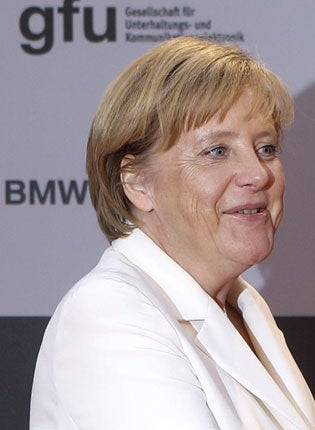Greens stoke backlash against Merkel's nuclear power extension

Your support helps us to tell the story
From reproductive rights to climate change to Big Tech, The Independent is on the ground when the story is developing. Whether it's investigating the financials of Elon Musk's pro-Trump PAC or producing our latest documentary, 'The A Word', which shines a light on the American women fighting for reproductive rights, we know how important it is to parse out the facts from the messaging.
At such a critical moment in US history, we need reporters on the ground. Your donation allows us to keep sending journalists to speak to both sides of the story.
The Independent is trusted by Americans across the entire political spectrum. And unlike many other quality news outlets, we choose not to lock Americans out of our reporting and analysis with paywalls. We believe quality journalism should be available to everyone, paid for by those who can afford it.
Your support makes all the difference.Chancellor Angela Merkel's cabinet met to agree plans to extend the life of Germany's atomic power plants yesterday amid angry protests from anti-nuclear activists and the country's two main opposition parties.
Hundreds of anti-nuclear protesters blaring on Vuvuzelas gathered outside Ms Merkel's Berlin Chancellery where she and her cabinet were meeting. They sent more than 2,000 black and yellow helium-filled balloons stamped with skulls and crossbones and atomic waste symbols into the skies above the capital.
Claudia Roth, a leading Green party MP pledged a campaign of "nationwide resistance" against the nuclear power extension. Ms Merkel's conservative liberal coalition wants to prolong the life of Germany's 17 nuclear reactors by up to 15 years in a move which overturns a previous Social Democrat-Green government's commitment to dispense with all atomic power by 2023 at the latest.
Her government argues that an early end to nuclear power is unrealistic if Germany is to achieve its long-term aim of becoming reliant on purely renewable energy. Under current plans, renewables will supply half the country's energy needs by 2050. "We need nuclear power as a form of bridging technology," Ms Merkel insists.
The German Chancellor has toured German reactor sites over the past month in an attempt to win support for her plans and her conservative Christian Democratic Party has even produced pro-nuclear placards featuring a smiling Ms Merkel clad in an environmentally correct green jacket alongside the cartoon character Mr Burns, from The Simpsons, who owns a nuclear power plant.
Yet her government's plans to continue with the atom met with loud and angry protests from both Germany's powerful anti-nuclear lobby and the country's opposition Green and Social Democratic parties yesterday in what is certain to be a foretaste of greater opposition to come.
The main opposition Social Democratic Party said it would cancel the project immediately if it gained power in the 2013 general election. Both parties also said they would fight the extension at Germany's constitutional court. Germany's Green party was largely founded on opposition to nuclear power and, despite global warming, the conviction that it is both dangerous and wrong remains strong.
Recent opinion polls have shown that 56 per cent of Germans want nuclear power to be phased out by 2023 as planned with only 38 per cent favouring an extension.
Join our commenting forum
Join thought-provoking conversations, follow other Independent readers and see their replies
0Comments